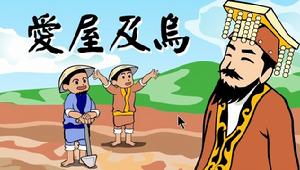爱屋及乌(英中对照)

Love me, love my dog.爱屋及乌
There was a state called zhou (周) in the chinese history.
中国历史上有一个国家名叫“周”。
One day, the king of zhou asked his officials for advice on deal with prisoners of war.
一天,周王问他的官员,应该怎样处理战俘。
An official said, "i once heard if you love someone, you are intended to love even the crows on the roof of his house; if you hate someone, you are intended to hate even the walls and the parapets of his. The prisoners of war were enemies fighting against us. In my opinion, we'd better kill them all."
一个官员说:“我以前曾听说:如果喜欢某个人,就连停留在那人住的屋顶上的乌鸦都喜欢;如果厌恶某个人,就连那人家里的墙壁和围墙都厌恶。战俘是我们的敌人,和我们是对立的,我觉得最好把他们全部杀了。”
But the king didn't agree with him."I think we should treat the prisoners of war differently by differing them into those who are guilty and those who are not. The guilty ones will be sentenced to death in order to avoid future disasters." Another official put forward his suggestion.
周王认为这样做不行。另外一个官员也提出了自己的意见:“依我看应该把战俘区分对待,把有罪的和无罪的、好的和坏的区分开来。有罪的战俘要处死,不能留下祸患。”
The king didn't think it was a proper way, either.
周王认为这样做也不大妥当。
Then a third one said, "Your majesty, I think all the prisoners should be set free and sent back home to work in the fields and support themselves by their own labor. Moreover, you should keep strictly the rules for reward and punishment and treat your relatives and friends impartially.The people are sure to believe in you if you administer our country by morals and laws."
接着,又有一个官员说:“大王,我认为应该把这些战俘全都放了,让他们回到自己的家里,耕种田地,自食其力。而大王对自己的亲人和朋友,也要赏罚分明,不能偏心。通过道德和法律来治理国家,人民肯定会对大王信服的。”
The king thought the official's proposal was quite reasonable so he accepted and followed it.As a result, the domestic situation soon settled down and gradually the country became more stable and stronger.
周王听后觉得很有道理,就按这个办法去做,结果国家真的很快安定下来了,变得越来越稳定和强大。
The idiom is then used to mean that if you love someone,you'll love people and things relative to him as well.
成语“爱屋及乌”后来就被用来比喻:因为喜爱一个人,连带和他有关的人或事物也喜爱、关心。
【文化链接】
“爱屋及乌”的英语表达大家也一定都有所耳闻了吧~就是“Love me, love my dog.”字面意思就是“爱我,就要爱我的狗”,比喻一个人如果喜欢一样事物或者人,他就会喜爱关于这个事物或是人的一切,也就是“爱屋及乌”的意思啦~

Love me, love my dog.爱屋及乌
中国历史上有一个国家名叫“周”。
一天,周王问他的官员,应该怎样处理战俘。
一个官员说:“我以前曾听说:如果喜欢某个人,就连停留在那人住的屋顶上的乌鸦都喜欢;如果厌恶某个人,就连那人家里的墙壁和围墙都厌恶。战俘是我们的敌人,和我们是对立的,我觉得最好把他们全部杀了。”
周王认为这样做不行。另外一个官员也提出了自己的意见:“依我看应该把战俘区分对待,把有罪的和无罪的、好的和坏的区分开来。有罪的战俘要处死,不能留下祸患。”
周王认为这样做也不大妥当。
接着,又有一个官员说:“大王,我认为应该把这些战俘全都放了,让他们回到自己的家里,耕种田地,自食其力。而大王对自己的亲人和朋友,也要赏罚分明,不能偏心。通过道德和法律来治理国家,人民肯定会对大王信服的。”
周王听后觉得很有道理,就按这个办法去做,结果国家真的很快安定下来了,变得越来越稳定和强大。
成语“爱屋及乌”后来就被用来比喻:因为喜爱一个人,连带和他有关的人或事物也喜爱、关心。
【文化链接】
“爱屋及乌”的英语表达大家也一定都有所耳闻了吧~就是“Love me, love my dog.”字面意思就是“爱我,就要爱我的狗”,比喻一个人如果喜欢一样事物或者人,他就会喜爱关于这个事物或是人的一切,也就是“爱屋及乌”的意思啦~
There was a state called zhou (周) in the chinese history.
One day, the king of zhou asked his officials for advice on deal with prisoners of war.
An official said, "i once heard if you love someone, you are intended to love even the crows on the roof of his house; if you hate someone, you are intended to hate even the walls and the parapets of his. The prisoners of war were enemies fighting against us. In my opinion, we'd better kill them all."
But the king didn't agree with him."I think we should treat the prisoners of war differently by differing them into those who are guilty and those who are not. The guilty ones will be sentenced to death in order to avoid future disasters." Another official put forward his suggestion.
The king didn't think it was a proper way, either.
Then a third one said, "Your majesty, I think all the prisoners should be set free and sent back home to work in the fields and support themselves by their own labor. Moreover, you should keep strictly the rules for reward and punishment and treat your relatives and friends impartially.The people are sure to believe in you if you administer our country by morals and laws."
The king thought the official's proposal was quite reasonable so he accepted and followed it.As a result, the domestic situation soon settled down and gradually the country became more stable and stronger.
The idiom is then used to mean that if you love someone,you'll love people and things relative to him as well.
 六年级上册英语书
六年级上册英语书 五年级上册英语书
五年级上册英语书 高二必修4英语书
高二必修4英语书 四年级下册英语书
四年级下册英语书 四年级上册英语书
四年级上册英语书 三年级下册英语书
三年级下册英语书